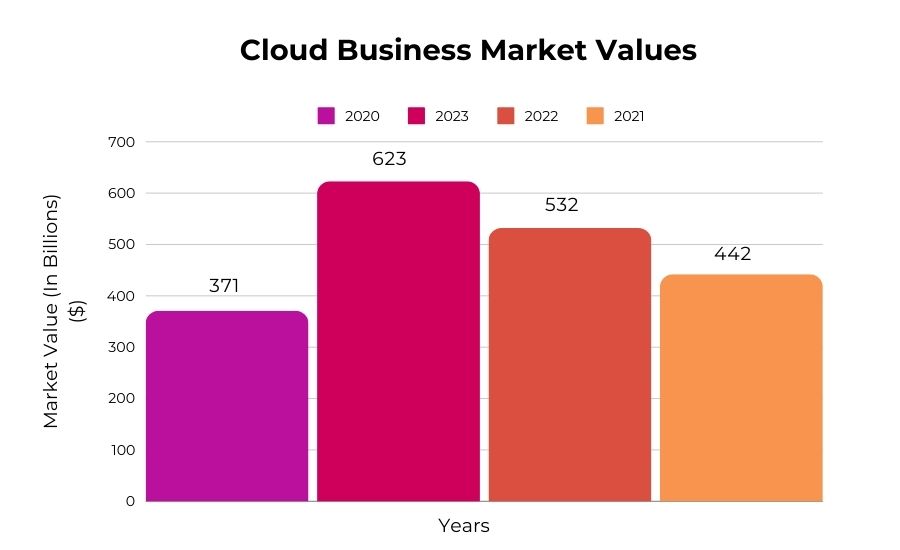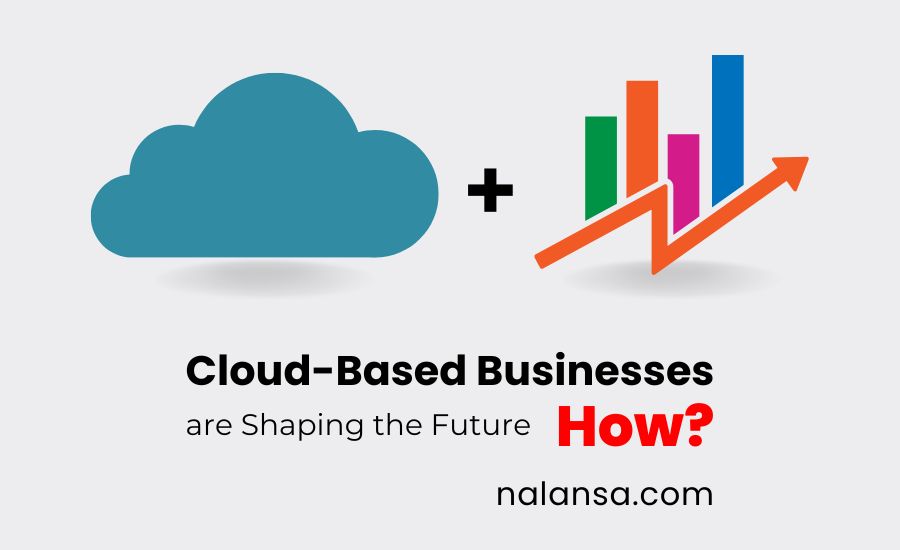The digital age has fundamentally transformed how businesses function and interact with their customers. Traditional models are giving way to a more agile, flexible, and cost-effective approach – cloud-based businesses. This transformative technology is revolutionizing the way companies work, store data, and deliver services. With its unparalleled scalability, cloud computing is empowering businesses to reach new heights.
As cloud-based businesses continue to grow, they’re driving innovation and growth in unprecedented ways. Industries are being transformed, and success is being redefined. The benefits of cloud computing are numerous, from cost efficiency to enhanced collaboration. But what does the future hold for cloud-based solutions? Will they continue to unlock new possibilities and drive business success?
In this article, we’ll explore the impact of cloud-based businesses on innovation and growth. We’ll delve into the ways cloud technology is transforming industries and driving success. We’ll also examine the benefits of cloud computing and the future of cloud-based solutions. Join us as we discover how cloud-based businesses are shaping the future of technology and innovation.
What is Cloud based Businesses?
A cloud-based business operates primarily using cloud computing technology, allowing it to store data, run applications, and manage operations over the internet rather than relying on traditional on-site servers. This approach offers businesses increased flexibility, scalability, and cost efficiency, as they can access their tools and data from anywhere with an internet connection. Cloud-based businesses can quickly adapt to changing demands, scale their services as they grow, and reduce overhead costs, making them more agile and competitive in today’s fast-paced digital world.
Key Reasons Cloud-Based Businesses Are Shaping the Future
Increased Flexibility
Cloud-based businesses allow teams to work from anywhere with an internet connection. This flexibility is crucial in today’s global market, where remote work has become the new norm. Whether employees are in different locations or on the go, cloud technology ensures seamless collaboration and access to important resources.
Scalability at Your Fingertips
Unlike traditional IT systems, cloud solutions can easily scale up or down based on business needs. Whether you’re experiencing rapid growth or seasonal fluctuations, the cloud provides the agility to adjust without the need for expensive hardware upgrades. This scalability helps businesses remain competitive and responsive to market changes.
Cost Efficiency
Cloud computing eliminates the need for costly infrastructure investments, such as physical servers. Instead, businesses pay only for what they use, which reduces upfront costs and ongoing maintenance expenses. This cost-effective model allows businesses of all sizes to benefit from enterprise-level technology without breaking the bank.
Enhanced Security
Data security is a top priority for any business, and cloud providers invest heavily in robust security measures. These include encryption, regular security updates, and advanced monitoring to protect sensitive information. Cloud technology also offers reliable backup and disaster recovery options, ensuring business continuity in case of unforeseen events.
Fueling Innovation
Cloud-based businesses have the ability to adopt new technologies, such as artificial intelligence (AI), machine learning (ML), and data analytics, more easily than traditional models. This capability helps businesses innovate faster, improve customer experiences, and stay ahead of the competition by embracing cutting-edge advancements.
Seamless Integration with Emerging Technologies
The cloud seamlessly integrates with other innovations like the Internet of Things (IoT), AI, and big data analytics. This allows businesses to collect, process, and data analyze vast amounts of data in real-time, driving smarter decision-making and opening new opportunities for growth.
Improved Collaboration and Productivity
With cloud-based tools, teams can collaborate in real-time, regardless of their location. This improves overall productivity and allows for faster decision-making and execution, a critical advantage in today’s fast-moving markets.
Sustainability and Green Technology
Cloud solutions also contribute to sustainability by reducing the need for physical data centers and lowering energy consumption. As cloud providers often use energy-efficient infrastructure, businesses can reduce their carbon footprint while also cutting costs.
The Future of Cloud-Based Business
The future of cloud-based businesses is incredibly promising as more companies continue to embrace the cloud for its vast potential in innovation, scalability, and efficiency. As technology evolves, cloud computing is set to become the backbone of business operations across every industry. Here’s a look at what the future holds for cloud-based businesses.

Increased Adoption of Multi-Cloud Strategies : Cloud-Based Businesses
Businesses are increasingly adopting multi-cloud strategies, using multiple cloud providers to enhance flexibility, reduce risk, and avoid vendor lock-in. This trend allows companies to take advantage of the best services offered by different providers, optimizing their operations while ensuring business continuity.
AI and Machine Learning Integration : Cloud-Based Businesses
The integration of artificial intelligence (AI) and machine learning (ML) into cloud platforms is already transforming how businesses operate. In the future, cloud-based businesses will leverage these technologies to automate processes, enhance decision-making, and personalize customer experiences. AI-powered cloud solutions will also enable advanced data analytics, giving businesses insights that were previously out of reach.
Edge Computing Expansion : Cloud-Based Businesses
As the need for real-time data processing grows, edge computing will become a critical part of cloud-based businesses. By processing data closer to the source—whether it’s IoT devices or local servers—edge computing reduces latency and increases efficiency. This will enable businesses to deliver faster services, especially in industries like healthcare, autonomous vehicles, and smart cities.
Enhanced Security Measures : Cloud-Based Businesses
With the growing reliance on cloud platforms, the focus on cybersecurity will intensify. The future will see advancements in cloud security protocols, including the use of AI for threat detection, stronger encryption methods, and more robust disaster recovery solutions. Businesses will prioritize security and compliance as data breaches continue to be a major concern.
Cost Optimization and Pay-As-You-Go Models : Cloud-Based Businesses
Cloud services are already known for their cost-efficiency, but the future will bring even more refined pricing models. Businesses will benefit from more transparent, usage-based pricing, allowing them to optimize costs based on their specific needs. This flexibility will make cloud adoption even more attractive for small and large businesses alike.
Sustainability and Green Cloud Solutions : Cloud-Based Businesses
As sustainability becomes a global priority, cloud-based businesses will focus more on reducing their environmental impact. Many cloud providers are already investing in green energy to power their data centers. In the future, more businesses will choose cloud solutions that align with their sustainability goals, contributing to a greener, more efficient global economy.
Conclusion
In conclusion, cloud-based businesses are undeniably shaping the future of various industries. As companies continue to embrace cloud technology, they are unlocking unprecedented levels of flexibility, scalability, and cost-efficiency. Moreover, the integration of advanced technologies like AI and machine learning is further enhancing operational capabilities and driving innovation.
Additionally, with the growing importance of security and compliance, businesses are prioritizing robust measures to protect sensitive data and build trust with their customers. The trend towards sustainable practices in cloud computing also reflects a commitment to corporate responsibility, ensuring that businesses not only thrive but also contribute positively to the environment.
Ultimately, as we move forward, the ability to adapt and leverage cloud solutions will be crucial for businesses aiming to stay competitive in an ever-evolving digital landscape. By recognizing the transformative power of cloud technology, organizations can position themselves for success, paving the way for a future that is not only innovative but also inclusive and sustainable.
Frequently Asked Questions (FAQ)
How has cloud computing affected current and future business processes?
Cloud computing has significantly transformed business processes by enabling flexibility, scalability, and cost efficiency. Currently, it allows teams to collaborate seamlessly from anywhere, enhancing productivity. In the future, businesses will increasingly leverage cloud technology to integrate advanced tools like AI and machine learning, automating tasks and improving decision-making. This shift will make organizations more agile and competitive in a rapidly changing market.
How does cloud computing impact industries?
Cloud computing has transformed industries by improving efficiency and driving growth. For instance, a report by Gartner indicates that worldwide public cloud revenue is projected to reach $597.5 billion in 2023, showcasing the rapid adoption of cloud services. In the healthcare sector, 90% of healthcare organizations reported using cloud computing, which enables secure data sharing and improved patient outcomes. Additionally, a survey by McKinsey found that 68% of organizations accelerated their digital transformation initiatives due to cloud technology, leading to increased innovation and enhanced operational capabilities across sectors. Overall, cloud computing is not just a trend; it’s a fundamental shift that reshapes how industries operate and compete.



